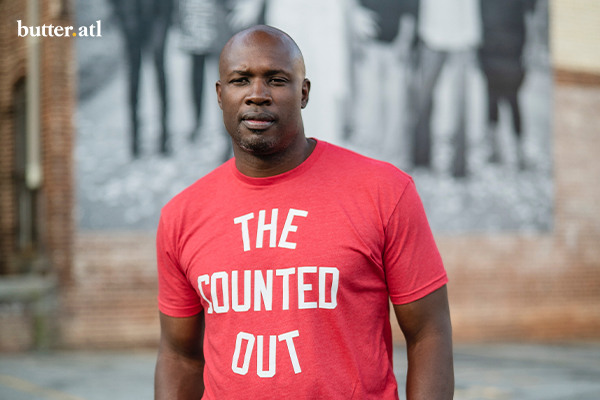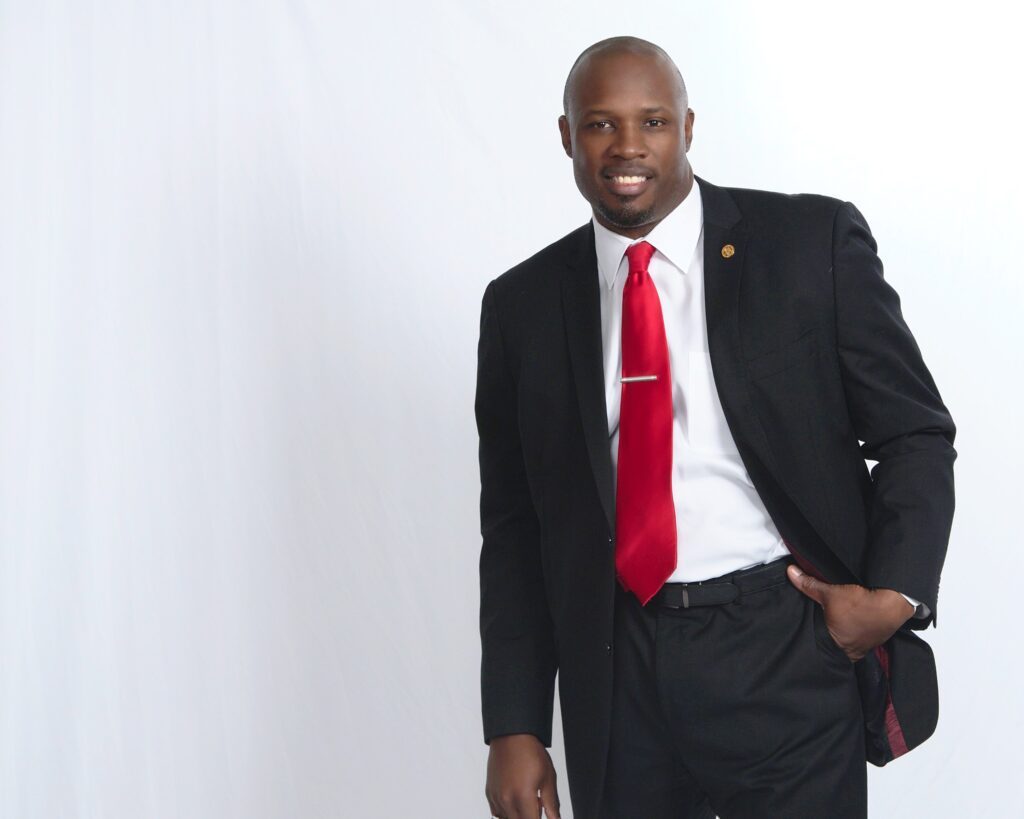The Churn
Former MLB Outfielder + ATL Native C.J. Stewart on The Immortality of Henry “Hank” Aaron
Mike JordanJanuary 28, 2021

Former Chicago Cubs outfielder C.J. Stewart, an Atlanta native, has a lot in common with Henry “Hank” Aaron, the pioneering Atlanta Braves hitter and home run champion who passed away unexpectedly Friday, January 22.
In a telephone interview with Butter.ATL’s editor-in-chief Mike Jordan, Stewart spoke about why Mr. Aaron lives on, through his legacy of creating opportunities in Atlanta, by setting an example of what it means to be simultaneously great and unapologetically Black, and more.
“This was a man who was called to do what he did. He had conviction and he was committed to his purpose, and he created change that’s long-lasting, through people like me.”
That statement is not a stretch. Stewart is a native Atlantan who grew up in a tough apartment complex on Hollywood Road — an area of Atlanta’s rapidly changing westside that’s taking a little longer to gentrify, if you will.
He went from swinging bats at John A. White Park to being drafted twice by the Chicago Cubs, then on to becoming one of America’s top baseball player development pros (his clients include Atlanta’s own Andruw Jones), and a best-selling author.
He and his wife Kelli also run L.E.A.D. (Launch, Expose, Advise, Direct), a non-profit organization whose mission is to provide inner-city youth with tools to create change in their communities through baseball, and ultimately through leadership. It’s his way of paying forward the inspiration he received watching Hank Aaron as a child, and following his example of manhood as an adult.
Stewart says he was also attracted to the parts of Aaron’s story that showed his high level of dignity, especially coming from humble beginnings. He notes that Aaron did not graduate from high school or attend college, but was able to achieve greatness by setting great expectations and leveraging his position to demand equitable respect.
Our 2014 profile of Hank Aaron, written for his 80th birthday: https://t.co/nsngJOU03w
— Atlanta Magazine (@AtlantaMagazine) January 26, 2021
“As awesome as he was, and as a son of Atlanta who did amazing things throughout the world, Dr. King, unlike Jackie Robinson, was not able to live anywhere in Atlanta because of Jim Crow laws. When Hank Aaron came from Milwaukee to Atlanta with the Braves, allowing the Braves to be the first major league sports team in the South, part of the condition of him being on that team and coming here was he had to be allowed to live anywhere he wanted to live.
“He chose to live in Southwest Atlanta, which is amazing.”
Stewart met Aaron twice. The first time, as unlikely as it sounds, was randomly serving together on jury duty in Atlanta when Stewart was 21 years old.
“It was crazy because I remember it was just kind of like, ‘Man, I’m going to be out of work for several days.’ And so I kind of went down with a negative spirit about it. And I remember coming into the large room and looking over and I’m like, ‘Man… that’s Hank Aaron!'”
Both men were selected as jurors, and spent a week together talking baseball and sharing perspectives on Atlanta, as Aaron was working for the Braves at the time. Later on, Stewart was involved in the 2017 unveiling of Aaron’s new statue at SunTrust Park, where they spoke briefly after the ceremony ended.
While the communication wasn’t enough for Stewart to claim having been a “friend,” he says he still felt a close connection. “I never reached out to get advice, but I was learning a lot about him just through his actions. The way he was doing things and how he was doing them, I was able to study from afar, and that was enough for me.”
The bond he felt was significant enough that when Stewart heard the news of Aaron’s passing, he says he felt a level of emotion that made it seem like he truly knew the man behind the mythological figure.
“This is a man who used baseball as a vehicle for social justice. So when I started to think about his passing, I had a sense of emotional urgency —even for myself at age 44 — that I was thinking about my passing. I don’t know when I’m going to leave this world, but I’m saying to myself, you know, ‘C.J., are you, are you doing enough? Are you committed and focused to stay on the path and put your all into this?'”
The “this” he’s talking about is baseball. It’s what Stewart knows and loves, and believes in, especially for young Black men. And when he talks about how the sport continues to struggle with popularity among younger African-Americans, his frustration is clear.
He believes Major League Baseball needs to do more, and he believes the community needs to be reminded of the importance of continuing the legacy of Blacks in baseball. He points out that 40 percent of players in the Negro Leagues (which celebrated its 100th anniversary in 2020) were college-educated, from HBCUs.
“When people started talking about Black ball players, not being smart enough to play the game and so on and so forth, the percentage of White players was drastically lower than 40 percent, because a lot of White players were coming into professional baseball out of high school, but most of the negro players were coming out of historically Black colleges. So these were college-educated men.”
Stewart also goes into depth about other important facts of how baseball impacted the Black community, such as how the game was supported by the Black church, how the Negro Leagues pioneered night games in baseball, and the wider economy of Black Americans, since it was one of the top Black-owned businesses in America until it ended.
“Right now, in 2021, when we start talking about how to increase the number of Black boys, and how to get more Black people involved in the game, I mean, that’s a slap in the face, considering the fact that baseball has been a part of our culture,” he says.
“If baseball does not matter to Black people, then we’ve really got some issues.”
The Braves are honored to announce the Henry Louis Aaron Fund to increase minority participation in baseball. #For44 pic.twitter.com/5VVSMu14c7
— Atlanta Braves (@Braves) January 26, 2021
It comes back to Aaron, Stewart believes, because he refused to turn his back to his people. “Hank Aaron was not a caricature. He was a called man that lived his life based on character. He wasn’t a shucking and jiving, bourgeois Black person disconnected from the oppression of Black people. He came from a humble beginning, but from what I saw and heard of him, he was able to easily connect with people that were being oppressed.”
For his part, Stewart says that folks need to also remember that Aaron did all of this without graduating from high school or attending college. He was a man who knew his purpose, and stood in that purpose to be what he was supposed to be.
Stewart believes that’s important not only for young Black men to understand, but anyone who wants to be involved in keeping Atlanta great. And he says that’s one thing he wishes he could still talk to Aaron about.
“If I was able to have some final words with him, I would explain to him what we’re doing now with the city, [and ask him] what to do for years to come, and just to get his thoughts on it.”

And Stewart says folks need to remember that Aaron did all of this without graduating from high school or attending college. He was a man who knew his purpose, and stood in that purpose to be what he was supposed to be. He didn’t make excuses; he made history. And this makes Stewart see a link to his own spirituality.
“People need to understand that Hank Aaron had the right framework, and he was always in the right fight until the day he died. So he’s somebody I’m going to continue to look to for the rest of my life. And, unapologetically. I want other black boys to aspirte to be just be like me, like, I’m trying to be him, and ultimately like I’m trying to be like Christ.”

